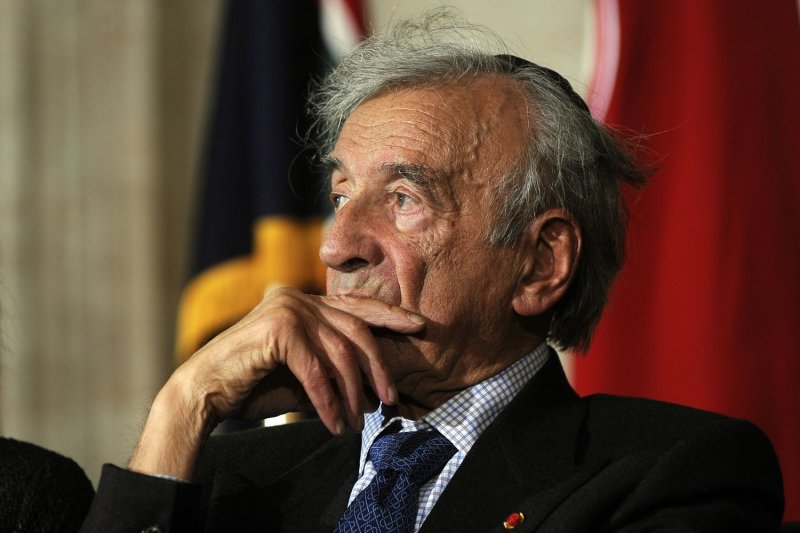1 of 2 | Elie Wiesel participates in a National Days of Remembrance commemoration of the Holocaust in the Rotunda of the U.S. Capitol in Washington in 2011. The author, academic and Holocaust survivor died Saturday. He was 87. File photo by Roger L. Wollenberg/UPI |
License Photo
NEW YORK, July 2 (UPI) -- Elie Wiesel, the Jewish author, Nobel laureate, academic and Holocaust survivor whose writings on unthinkable Nazi brutality brought the reality of the world's largest genocide into stark relief, died Saturday in his Manhattan home, the Israeli Holocaust center Yad Vashem announced. He was 87.
His autobiography, Night, chronicled Wiesel's tragic path as a teenager through the Nazi death machine during World War II and begat a global reckoning in the aftermath of the Holocaust: how did it happen and, for the author, how could he justify his own survival in the face of so much death and suffering?
In the years after his landmark recounting, Wiesel went on to become a prominent and moving spokesman against other atrocities including the African genocides in Rwanda and Darfur and ethnic cleansing in the Balkans, earning him a place as a global conscience to human suffering on a mass scale.
His work as witness to genocide and his refusal to silently accept international indifference to it earned him the Nobel Peace Prize in 1986.
President Barack Obama, who, along with German Chancellor Angela Merkel, accompanied Wiesel on a tour of Nazi concentration camps in 2009, recalled the writer as a ceaseless advocate against hatred.
"He raised his voice, not just against anti-Semitism, but against hatred, bigotry and intolerance in all its forms," Obama said Saturday in a statement. "He implored each of us, as nations and as human beings, to do the same, to see ourselves in each other and to make real that pledge of 'never again.'"
Wiesel was born to religious parents in the town of Sighet, Romania on Sept. 30, 1928. At the age of 15, the Nazis moved Wiesel and his family into a ghetto in their town before sending them to Auschwitz-Birkenau concentration camp. From there, Wiesel and his father were transferred to Buchenwald in 1945, where his father, stricken with dysentery, was beaten and died four months before the camp was liberated by U.S. soldiers.
Alone after the war, Wiesel was taken to France with a group of orphan Jews in 1948, where he was eventually reunited with his only two immediate family members to survive the Holocaust, older sisters Beatrice and Hilda.
In France, Wiesel studied literature and journalism until 1951. After that, he moved to New York City, where he worked as a foreign correspondent for an Israeli newspaper.
It was there Wiesel wrote his signature memoir, Night, a recounting of his time in the Romanian ghetto and Nazi concentration camps. The book stands as one of the most moving and well-read recountings of the Holocaust.
Wiesel wrote the book initially in Yiddish and the first version, at more than 800 pages, was published under the title And the World Remained Silent. A subsequent, much shorter version was published in French in 1958, under the title La Nuit. It was translated into English under the title Night in 1960.
The book's namesake passage offers a haunting and deeply emotional reflection on the Holocaust, and the guilt many survivors felt for having lived when so many others perished.
"Never shall I forget that night, the first night in camp, which has turned my life into one long night, seven times cursed and seven times sealed," Wiesel wrote. "Never shall I forget that smoke. Never shall I forget the little faces of the children, whose bodies I saw turned into wreaths of smoke beneath a silent blue sky. Never shall I forget those flames which consumed my faith forever. Never shall I forget the nocturnal silence which deprived me, for all eternity, of the desire to live. Never shall I forget those moments which murdered my God and my soul and turned my dreams to dust. Never shall I forget these things, even if I am condemned to live long as God himself. Never."
While initial sales were slow, a number of glowing reviews helped it gain national attention. Night would go on to sell more than 6 million copies and has been translated into more than 30 languages.
It became the first in Wiesel's trilogy of Holocaust books, including Dawn and Day.
Wiesel would go on to write more than 40 works of fiction and nonfiction while remaining a frequent newspaper contributor, as well. He also spent time lecturing at Boston University, City University of New York and Yale University, among other schools.
Wiesel officially became a U.S. citizen in 1963 and played a major role in the creation of the national Holocaust Memorial and Museum in Washington, D.C., after former president Jimmy Carter appointed him chair of the Presidential Commission on the Holocaust in 1978.
Wiesel's words, "For the dead and the living, we must bear witness" are etched in stone above the memorial's entrance.
In 1986, Wiesel was awarded the Nobel Peace Prize for his writing and public advocacy against violence, repression and racism. He was also granted the U.S. Medal of Freedom, the rank of Grand Croix in France's Legion of Honor and was honorarily knighted by Queen Elizabeth II of England. He was also awarded Israel's President's Medal of Distinction in 2013, where he was once rumored to be a potential presidential candidate, though he never ran for elective office.
Israeli Prime Minister Binyamin Netanyahu issued a statement mourning Wiesel's death.
"In the darkness of the Holocaust, in which our sisters and brothers were killed -- six million -- Elie Wiesel served as a ray of light and example of humanity who believed in the goodness in people."
He is survived by his wife, Marion, son Shlomo and stepdaughter Jennifer.















